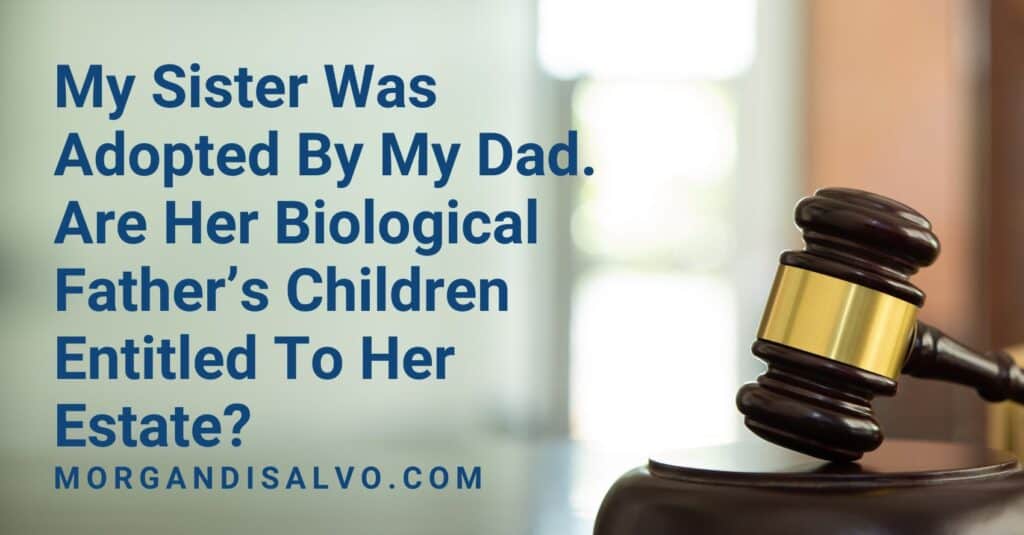Question: My sister, whom my late father adopted, passed recently. She had no living spouse and no children or grandchildren. Her biological dad, who is also deceased, had several children. Are they entitled to her estate?
Loraine’s Answer: Please note: I will assume that your sister resided in Georgia, so that Georgia law applies. If your father legally adopted your sister, the adoption would have cut off any members of her biological father’s family as potential heirs to her estate. That means that it’s very unlikely that her biological father’s children would have any rights with regard to your sister’s estate as heirs. However, if your sister left a Will that named her biological father’s children or others as beneficiaries, then they would have rights as beneficiaries even if they have no rights as heirs. It’s critical to make the distinction: “Heirs” are the people who are entitled to a person’s net probate estate if that person had no Will; beneficiaries are people who are given rights with regard to a person’s net probate estate under that person’s Will, or who are designated as beneficiaries under beneficiary designations.
If your sister had a Will, under Georgia law she would be free to leave her estate to whomever she wished, whether those persons were her heirs or not. You don’t mention your sister having a Will, so at this point I will assume that she didn’t.
If your sister did not have a valid Will in place at her death, then her net probate estate (the assets that are left after all debts, expenses, and taxes have been paid) will be distributed to her heir or her heirs, as those heirs are determined under state law. In Georgia, if a person dies without any surviving spouse and without any surviving child, grandchild, or other descendant, then that person’s legal parents are that person’s heirs. You mention that your father, who had adopted your sister, is already deceased, so I assume he died before she did. If your mother was also your sister’s mother, and if either both she and your father adopted your sister or your mother was your sister’s parent already, before the adoption and the adoption was a stepparent adoption by your father that left your mother still recognized as your sister’s mother, then, if your mother is still living, she would be your sister’s only heir. If your mother is also no longer living, then your sister’s legally recognized siblings would be next in line as her heirs. Her legally recognized siblings are the children of her legal parents, which would include your father, so it’s your father’s children who would be in line as your sister’s heirs. A living sibling, like you, would be an heir. If your sister had any sibling who died before she did and that sibling had children who all survived your sister, then that sibling’s children will be your sister’s heirs in place of that sibling. Each sibling, living or deceased, shares equally in your sister’s net estate if they are her heirs.
I recommend getting a probate attorney to sit down with you and review all of the relevant facts to be sure you know who your sister’s heirs are before you go to the probate court to get an Administrator appointed for her estate or to offer her Will for probate, if she has one. Knowing the identity of the heirs will be critical as part of either process.
Key Estate Planning Takeaways: When a child is legally adopted by two new parents, the new parents and the new parents’ families replace the child’s biological parents and the biological families as potential heirs. If a child is legally adopted by a stepparent who is married to one of the child’s biological parents, then the adoption cuts off the legal rights of the other side of the child’s biological family, including the other biological parent and that biological parent’s other children. If a person who has been legally adopted wants to benefit members of that person’s biological family, then the adopted person should ensure that the desired biological relatives are named as beneficiaries under the adopted person’s Will, revocable trust, or other estate planning documents. Anyone acting as the proposed executor or administrator of the estate of someone who was legally adopted by another person during his or her lifetime should consult an experienced probate attorney for help determining who the person’s heirs may be.
This “Q&A with Loraine” blog series features answers from Morgan + DiSalvo Partner Loraine DiSalvo that are based on questions originally posted on www.avvo.com. A key takeaway from each exchange highlights an important facet of estate planning.


